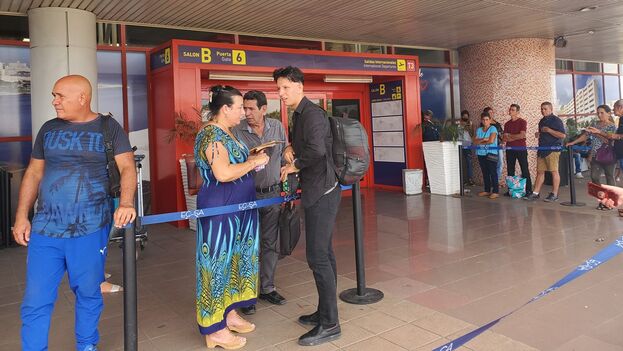
![]() 14ymedio, Yoani Sánchez, Generation Y, Havana, 29 November 2023 — Most of them are men, carrying only a small backpack as luggage. The line to check in at the Conviasa counter at Havana’s José Martí airport moves quickly. The flight goes direct to Managua, but the Nicaraguan capital is only the gateway to a route that will reach the southern border of the United States. Despite the recent sanctions imposed by Washington on the owners and executive of airlines that profit from the Cuban immigration drama, the planes continue to take off towards Nicaragua.
14ymedio, Yoani Sánchez, Generation Y, Havana, 29 November 2023 — Most of them are men, carrying only a small backpack as luggage. The line to check in at the Conviasa counter at Havana’s José Martí airport moves quickly. The flight goes direct to Managua, but the Nicaraguan capital is only the gateway to a route that will reach the southern border of the United States. Despite the recent sanctions imposed by Washington on the owners and executive of airlines that profit from the Cuban immigration drama, the planes continue to take off towards Nicaragua.
A few days ago Marco de Jesús’s world fell apart. With the tickets, for him and his brother, already purchased from the Dominican company Air Century to travel to Managua, a brief email notified them of the cancellation of that connection. It was one of the first companies to react to the new US visa restriction policy aimed at the airline companies that have been selling migrants from the Island tickets to Central America at “extortion” prices.
For this 38-year-old Havana native, the US penalty could not have come at a worse time. After selling his home and an electric motorcycle, he had managed to raise the more than 4,000 dollars that the two tickets for the short section between Havana and Managua cost him. “We have everything ready to leave and now we are making claims to get our money back,” he says with uncertainty. Although he agrees that such high prices are “an abuse,” he is willing to pay that amount again or more in order to “leave this country.”
“We have everything ready to leave and now we are making claims to get our money back”
Daniel Ortega’s regime understands well the desperation of Cubans. With the visa exemption for the island’s nationals, which came into effect at the end of 2021, it killed two birds with one stone: taking part of the large dividends left by this constant flow of migrants and, in the process, increasing the pressure on the US border, with the consequent increase in internal criticism of the immigration policy of Joe Biden’s Administration. Ortega filled his pockets with the urgency of some, and put his archenemy from the North on the ropes.
Competing for the pieces of that cake, amassed with the restlessness of thousands of people eager to leave the Island at any cost, others such as the Venezuelan state-owned Conviasa and the Havana regime itself also joined in. Behind the scenes, the Cuban authorities presumably allowed, and turned a blind eye to, the advertisements with supposed tourism packages to see “the Nicaraguan volcanoes,” when everyone knew that these were trips of no return. For two years money flowed into the pockets of all three regimes. No one knows for sure how much they pocketed, but given the cost of each ticket, it could be millions of dollars.
Now, part of the tap has been turned off with the new penalty implemented by Washington, but it is a just a question of time before tricks and detours appear to maintain these lucrative connections. Marco de Jesús and his brother do not want to admit it, but they are just pieces being played with by the three insatiable authoritarianisms when it comes to appropriating resources and for which migration is the new spearhead of their geopolitics.
________________________
Editor’s Note: This text was originally published in Deutsche Welle in Spanish.
____________
COLLABORATE WITH OUR WORK: The 14ymedio team is committed to practicing serious journalism that reflects Cuba’s reality in all its depth. Thank you for joining us on this long journey. We invite you to continue supporting us by becoming a member of 14ymedio now. Together we can continue transforming journalism in Cuba.
